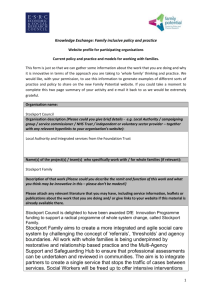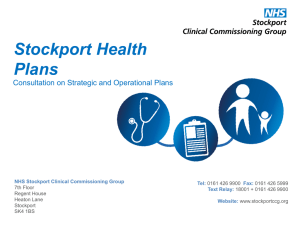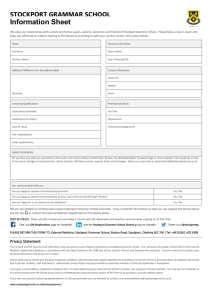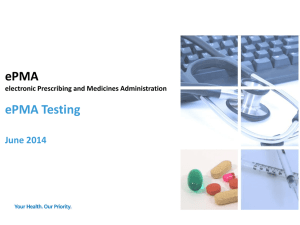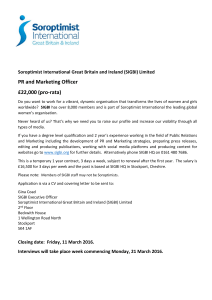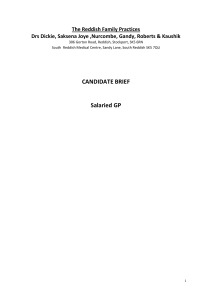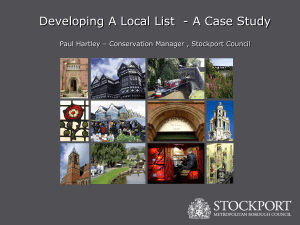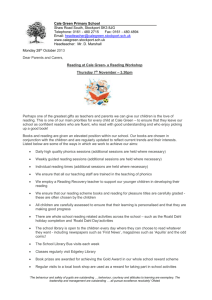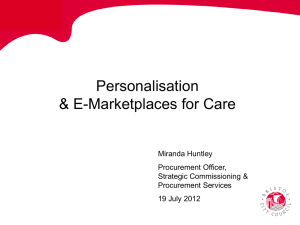Quality Account 2011/12 1
advertisement
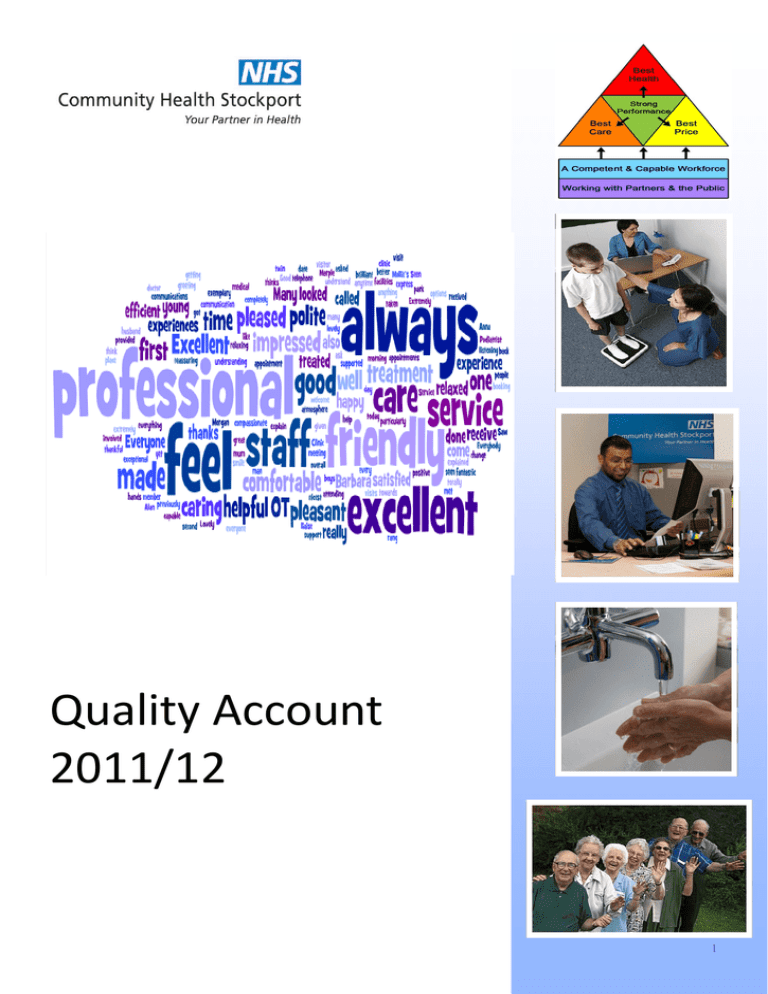
Quality Account 2011/12 1 Contents Quality Narrative 3 NHS Stockport Statement 4 Review of 2010/2011 Stockport Clinical Commissioning for Quality 5 Care Quality Commission Data Quality 6 Information Governance 7 Review of Services Service Reviews 8 Patient Safety 9 Patient Experience 14 Clinical Effectiveness 18 Continuous Quality Improvement and Innovation 20 Workforce 22 Stockport LINKs Statement Contact Us 27 2 Statement of Quality In 2008, former Health Minister Lord Darzi published the ‘High Quality Care for All’ report. The aim of the report was to ensure the NHS provided high quality and effective patient care by making it publicly accountable for the services it delivers. The report also proposed that all organisations providing services for the NHS should be required to publish annual ‘Quality Accounts’ - a yearly report to the public about the quality of services delivered. Community Health Stockport (CHS) is an NHS organisation which delivers healthcare, early intervention and health improvement outside of hospital and within the communities of Stockport. Legally, we are part of NHS Stockport but we operate as an Autonomous Provider Organisation. This enables us to concentrate on providing high quality services to patients, while the commissioners of NHS Stockport focus on securing the best healthcare for the population of Stockport. We have made our commitment to the population of Stockport through: Improving health and providing services no matter who you are or where you live in Stockport; Organising our services to reduce the length of time you have to wait, involve you, your family and carers in your care, and include other Laura Foster services when needed; Interim Director of Improving and providing high quality services that meet or exceed NHS Community Health standards; Ensuring that we keep you safe by making sure the environment in Stockport which we provide care is clean and safe, that our staff are well trained, that we use the available evidence to provide the best care and that we continuously monitor standards and look for areas to improve; Listening to people who use our services so that we can continuously improve them and develop the services based on their needs. Community Health Stockport provides a comprehensive range of services to care for everyone in our communities throughout their lives. Services like Health Visiting and Children’s Therapy support children, young people and their families including those with disabilities. Services like District Nursing, Palliative Care and Rehabilitation provide care for adults and older people including those with a long term illnesses, those requiring ongoing treatment or rehabilitation following a hospital admission, those requiring short term treatment for an injury or illness and those requiring support and care at the end of life. The health inequalities between Stockport’s most and least deprived neighbourhoods present us with a real challenge with the gap in life expectancy between these communities being 12 years for men and 9 for women. It is vital we continue to work with our partners to redress the balance whilst continuing to offer high quality care to all of Stockport’s 285,000 residents. Community Health Stockport has a good track record of working well with our partners like the Local Authority, Stepping Hill Hospital and General Practitioners to ensure that the care we provide is ‘joined up’ and we are able to deliver the right care, in the right way and in the right place. From April 2012, Community Health Stockport will be merging with Stockport Foundation Trust (Stepping Hill Hospital) to form one health care provider for the Stockport population. 3 NHS Stockport Statement NHS Stockport believes that the Annual Quality Account of Community Health Stockport is a true and balanced reflection of its achievements in the year 2011-12 and that it meets the requirements of such a document. It is also reflective of the commitment to service quality and continual improvement evident across the service and required by the commissioner. This continued focus on quality during a difficult year of preparation for transition to a new organisation on April 1 st 2012 is commendable. NHS Stockport receives a detailed quality report, serious untoward incident reports and patient complaints data quarterly and other reports on quality issues throughout the year. It reviews these with CHS at its quarterly contract meetings where discussion of service quality is always an agenda item. We also have frequent one-to-one discussions on specific issues as the need arises. As a consequence we believe the facts and evidence submitted are correct. We would particularly highlight the following four areas of successful work. CHS achieved nearly all the quality targets (CQUIN) that the commissioner set for it despite the focus of its senior management of service transfer. This was an excellent result and demonstrates that quality whilst led from the top is seen as a high priority across the organisation. To achieve this it is necessary that staff at all levels feel empowered to make improvements in quality. The staff survey results indicating a greater than average ability to contribute to improvements and sense of feeling value by colleagues are significant in this respect. The work done on training and development is also of a high standard. CHS gives a number of examples of working with other agencies and not being unduly inwardly focussed. So for example inter-professional learning and the QIPP safe care recognition reward indicate a desire to work across service and professional boundaries essential for real quality improvement. Fourthly, CHS continues to look in detail at its own services through service reviews and walk-about’s by senior managers. This visible focus on service quality and willingness to publish findings is indicative of quality improvement being understood as a priority at the top. Going forward the challenge for CHS will be to maintain this focus on quality as it joins a much larger organisation with differing approaches in some areas. In particular as commissioners we would wish to see a continued focus on those areas highlighted above in delivery of CQUIN, staff empowerment to lead quality improvement, multi-agency working and a top team understanding of local service quality. In addition we would like to see CHS services improve further in three specific areas: Firstly, build on their patient satisfaction monitoring to broaden it to understand their other “customers” better. Secondly, make much more headway on pressure ulcer reduction. And finally despite scoring reasonably well on the IG toolkit score there remain too many instances of data loss and the commissioners would expect specific reference to this issue in any future account. 4 NHS Stockport Commissioning for Quality NHS Stockport (Stockport PCT) buys Community Health Stockport’s services on behalf of the people of Stockport. A proportion of Community Health Stockport income in 2011-12 was conditional on achieving quality improvement and innovation goals which were agreed between Community Health Stockport and NHS Stockport (the PCT Commissioner) through the Commissioning for Quality and Innovation (CQUIN) element of the NHS contract. The use of CQUIN reflects the discussions between the PCT Commissioners and Community Health Stockport in striving to continually improve the quality of care and services we provide. The 19 CQUIN quality indicators for 2011-12 were in 7 goal areas Area Achieved Improving the quality of our data Delivering the Health Child Programme Reducing waiting times for clinics End of life care Measuring the healing rates of wounds Infection prevention and control Staff Immunisation Rates 17 out of the 19 indicators were achieved. The two indicators that were not achieved were: One relating to end of life care. There is an action plan in place to bring about improvement. One relating to reducing the number of pressure ulcers in the community. There is on-going work to ensure we reduce the number. Each year, new CQUIN indicators will be negotiated and will reflect the aim continuously to improve our services and the outcomes for the people we work with. Further details of the agreed goals for 2011-12 and for the following 12 month period are available by writing to our Quality Team email address QualityTeam@stockport.nhs.uk, also see contact details at the rear of this publication. 5 Care Quality Commission The Care Quality Commission (CQC) regulates all health and adult social care services in England, the NHS, Local Authorities, private companies and voluntary organisations. The CQC makes sure that essential common standards are being met where care is provided. Community Health Stockport is required to register with the Care Quality Commission and our application for registration was approved with no additional conditions required. The Care Quality Commission has not taken any enforcement action against Community Health Stockport, or been involved in any investigations by the CQC during 2011-12. However , Community Health Stockport were asked by the Care Quality Commission to provide evidence to show compliance to outcome 16 : Assessing and monitoring the quality of service provision . The organisation also took part in a joint Ofsted and CQC inspection for Safeguarding Children and Looked After Children. Further information about registration is available from www.cqc.org.uk as well as published reports. Data Quality Community Health Stockport’s continuing commitment is to improve patient care by taking a proactive approach in improving the quality of data that is recorded on our electronic systems. Since the implementation of Lorenzo (an Electronic Patient Record) in 2008 this has enabled us to obtain daily information about the types of contacts and the completeness of those records. During 2011/12 not only has there been further development of our reporting system which was implemented in 2010, but we have also implemented a scheduling system, which has greatly improved capacity and recording of detailed information. The reporting system provides managers and directors with daily up to date information about their service, this enables a high quality of clinical care which is cost effective and identifies where efficiencies can be made without hindering patients’ safety. For 2011/12, we set a key business objective of making sure that all services are in a position to record, report and analyse their activity and performance data. This will enable them to manage capacity and demand, ensure delivery of contractual requirements, increase quality of services and measure the outcomes from service improvement initiatives. The chart shows some of our key data quality indicators. We are instigating an action plan to start to improve the collection of information about ethnicity throughout 2012/13: 6 Key data quality indicators Information Governance Information governance is the term used to describe the set of standards that the NHS must follow to make sure that it carries out its duty to: · maintain full and accurate records of the care provided to service users · keep records about service users confidential, secure and accurate. The NHS take the confidential nature of our work very seriously and each year we undertake an audit of our performance through the Department of Health’s Information Governance Toolkit, which includes a staff training package. In 2011-12, NHS Stockport reached the required level on 39/41 requirements, resulting in an overall score of 66% on the Information Governance Toolkit - an improvement of 36% on last year’s submission. 94.2% of staff successfully completed their mandatory IG training in 2011/12 – 93.07% among the community services team. This showed major progress on last year’s pass rate of 46%. An action plan has been developed to reach level two on the remaining two requirements, through increased training for staff responsible for maintaining Information Asset Registers. The Internal Audit department has approved our action plan for 2011/12 and are satisfied that we will meet all requirements by early 2012/13. With senior management support we will continue to raise the importance of Information Governance training and ensure the engagement of key staff members. 7 Review of Services During 2011-12, Community Health Stockport provided 31 NHS services. Community Health Stockport has reviewed all the data available to them on the quality of care of these 31 NHS services. This report will focus on our quality measure of ‘Service Reviews’, followed by the three areas within the national definition of quality in the NHS: Patient Safety Patient Experience Clinical Effectiveness Service Reviews The Service review process focuses on each individual service provided by Community Health Stockport and measures it against the national quality standards. Each service has to present it’s evidence about how it meets the quality standards and the process has been updated to reflect the 16 Essential standards of quality and safety produced by the Care Quality Commission (CQC) in 2010. In deciding which of the 16 CQC outcomes services needed to provide evidence for, the following criteria were used: Number of patient safety incidents Number of complaints Number of risks This was completed so that the outcomes allocated to each service were the most appropriate. The services which had not previously undertaken a service review or had scored below 80 per cent in a previous service review, are required to produce evidence for all 16 of the outcomes. During 2011-2012 7 services have been reviewed and all services scored above 90 per cent. The results can be seen in the table below. Service Review Results 2011-12 100 Percentage 80 60 40 Score 20 0 Intermediate Care Score 100 Specialist Community Palliative Continence Development Care 100 92 100 District Nursing 93 Nutrition and Adults Physio Dietetics 100 100 8 Review of Services Mini Inspections During 2011-12 we also introduced mini inspections following the format of the Care Quality Commission (CQC) inspections. The main purpose was to mirror the Care Quality Commission inspection process, prepare staff for future inspections, to assure the board that we are compliant with regulations, to improve staff knowledge of the CQC and regulation process, to identify areas for action and to provide evidence to the CQC of proactive monitoring. The inspections include: Observation of care being delivered A staff Interview and A patient Survey All elements were scored giving an overall percentage CQC Mini Inspection Project 2011-2012 90% 80% Percentage 70% 60% 50% 40% 30% 20% 10% 0% Score Community Rehab CASH Children's Therapy Smoking Cessation Health Visiting 94% 97% 96% 96% 97% 9 Patient Safety Patient safety remains a priority for Community Health Stockport (CHS). Staff are encouraged to report incidents, and near misses, so that we can learn from them and improve practice for the future. CHS continues to report patient safety incidents to the National Reporting and Learning System (NRLS) on a regular basis. Benchmark Incidents National Patient Safety Agency Report The NRLS is a central database of patient safety incident reports. The following report shows the latest published incidents submitted by Community Health Stockport between April 2011 and September 2011 and is a benchmark with other organisations. The report shows that: As an organisation we report incidents in a timely way showing effective reporting systems As an organisation we report incidents on a regular basis showing a positive patient safety culture As an organisation, we are better than average in 9 out of the 11 reporting categories The 2 categories that require further work in order to improve safety of patients are: Medication Errors Pressure Ulcers Volume of Reporting Between April and September 2011 we reported incidents in 6 out of 6 months CHS sits just above the average in terms of volume of reporting - higher reporting rates being seen as a positive measure of the safety culture in an organisation 50% of all CHS incidents are submitted to NRLS just above 7 days of them being reported What do we report? Incidents that have been reported fall into a number of different categories, as shown below. As an organisation, we are better than average in 9 out of the 11 reporting categories 10 The top 2 categories that we report on are: 1. Medication Errors: Improving safety for patients and learning from incidents is a priority for the organisation. Considerable work has been done over the year focusing on reducing the number of medication errors. This has included a project that looked at the whole process of medication administration. Following this project, there has been close analysis of medication errors within the district nursing service. Another area now in development is the electronic patient index which will reduce patients being accidentally missed off visiting lists. 2. Pressure Ulcers: The Implementation of Care Category includes the reporting of pressure ulcers. Stockport reports 3 different categories of pressure ulcers whereas some areas only report 2 categories, therefore Stockport figures will generally show higher than average. However, each pressure ulcer incidents is individually investigated in order to learn lessons and to continuously improve patient care. As part of the Safety Express initiative, developed by the Advancing Quality Alliance (AQuA), CHS IS looking to reduce pressure ulcer numbers by 30% (of the 2010/11 total) during the next 2 years. Safety Express Community Health Stockport is currently taking part in the Safety Express programme as the host organisation. This means that we are the lead organisation for the programme working in partnership with Stockport NHS Foundation Trust and a number of care homes. This work is across the whole health economy. Safety Express is a national improvement programme which aims to achieve significant reductions in four avoidable harms: pressure ulcers, serious harm from falls, catheter acquired urinary tract infections and Venous Thrombo Embolism (VTE). It also supports improvements in efficiency. The specific aims for the programme are: Category III & IV pressure ulcers reduced by 80% in hospital Category III & IV pressure ulcers reduced by 30% in community Catheter acquired urinary tract infection reduced by 50% Serious injury from falls reduced by 50% Venous Thrombo Embolism reduced by 50% 11 Achievements so far Leadership walk rounds As an organisation we are registered with the Patient Safety First Campaign to show our commitment to patient safety. Community Health Stockport continues the leadership walk rounds which are led by either the Director or an Associate Director accompanied by a patient safety lead. It is an opportunity for staff to voice any patient safety concerns they may have, directly to senior staff. During 2011/12, Leadership walk rounds have been occurred at the following community bases: North Reddish Heald Green Beckwith House Kingsgate Regent House Hazel Grove The visits have been embraced positively by front line staff. Action plans are developed from each visit and this has encouraged staff to share their innovative ideas. This is an important point as and how to reduce the spread of infection as well as informing staff about policies that are available to support them and who to contact if necessary. Infection Prevention and Control Provision of safe care involves good infection prevention and control and a number of practices help to demonstrate our commitment to promoting this. The practices described below help to demonstrate compliance with the Health and Social Care Act (2008) and the Care Quality Commission’s Essential Standards of Quality and Safety Training All staff receives infection prevention and control training on commencement of employment and clinical staff receive update training on a regular basis. Training includes the principles of infection prevention and control, and understanding of how infections are transmitted . 12 Hand Hygiene Good hand hygiene is the single most important measure to avoid the transmission of harmful germs and prevent the spread of infections. The Clean your hands campaign, aimed at improving hand hygiene nationally, was launched in community settings in 2008. Community Health Stockport has been a part of the campaign since it was launched. Posters and information leaflets are available in all of our clinics. We have 21 staff who champion hand hygiene in the workplace and who meet regularly to ensure hand hygiene remains a priority in maintaining patient and staff safety. CHS takes hand hygiene very seriously and in the last 12 months 95 staff have had their hand hygiene practice audited. This involves staff demonstrating their hand washing technique and awareness of the hand decontamination policy. Essential Steps to Safe, Clean Care The Department of Health introduced Essential Steps in 2006 with the aim of reducing infections. When caring for patients, staff use the best practice and national guidance Essential Steps recommends. They are assessed regularly to ensure they are competent to deliver safe care. Clinics and Health Centres Clinics and health centres are assessed annually to ensure that healthcare environments meet cleanliness and infection prevention and control standards. There has been a joint effort with the assessments this year with staff from Stockport Clinical Commissioning Group’s Health Protection and Control of Infection Unit undertaking environmental assessments and CHS staff assessing clinical practice elements. The environmental assessments take into account the fabric of the buildings, fixtures and fittings. Scores ranged between 58 to 90%, demonstrating that some work is required in the older clinics which were not built with today’s modern purposes in mind. The clinical practice elements include hand hygiene technique, safe disposal of sharp instruments and waste, effective stock rotation, safe storage of vaccines and general environmental tidiness. Scores for clinical practice ranged between 76 and 100%. There has been some work undertaken to improve the safe storage of vaccines to ensure national standards are met and a review of waste practices was undertaken as a requirement to ensure compliance with national guidance. Advancing Quality Alliance (AQuA) Community Health Stockport is involved in a national programme aimed at improving patient safety. We have a collaborative working group looking at reducing harm for patients with urinary catheters who may be at risk of developing urinary tract infections. The group includes nurses and representatives from Community Health Stockport, NHS Stockport, Stockport NHS Foundation Trust and Borough Care. Specialist input from the microbiology team at Stepping Hill Hospital, pharmacists and GP’s is available when required. The group is looking at standardising information and care related to urinary catheters across Stockport in order to improve patient safety. This programme is ongoing until December 2012. Further information is available from www.advancingqualityalliance.nhs.uk 13 Patient Experience Customer Care Community Health Stockport (CHS) is committed to; Putting patients and service users at the heart of all we do, Listening to local people, Making sure our services meet their needs and preferences, Actively encouraging them to express their views and experiences of our services, Improving the way we deliver services as a direct result of feedback, Informing them how their feedback has been used, Giving people a say on how services are planned, delivered and evaluated. We are working hard to achieve these progressive aims through the introduction of a number of initiatives: People’s Champions All CHS services have a nominated Champion who is the link person for Customer Care. Their role involves: Planning patient experience surveys for the service, Disseminating customer care information to colleagues and Ensuring that patient experience is considered at all team meetings. Dignity in care Champions CHS supports the Dignity in care agenda and is committed to providing high quality services that respect people’s dignity. This has been achieved by; People’s Champions working within their teams to promote the dignity challenge and encouraging colleagues to sign-up Presentations to groups of staff including Clinic Administrators and students on placement in Stockport CHS Director and Associate Directors registering themselves and wearing the Dignity pin-badge We currently have approximately sixty staff registered on the national data-base. Our target is to continue to increase the numbers over the next year. 14 % Satisfaction (Good/Excellent) Patient Experience Surveys Capturing the experiences of the patients and public who use CHS services is very important. Our Customer Care Strategy sets out the direction for the engagement work. During the past year CHS has undertaken Patient Experience Surveys in a number of services. In the second half of the year, electronic touch-screen devices have been used which has made collecting patient experience much easier. Twelve services used the devices during 2011/12 and all have produced individual reports and actions/ recommendations. Patient Satisfaction by Survey 100 80 60 40 20 Some of the points raised by those surveyed were: CFS/ME – The survey highlighted service users concerns with the duration of the course and meetings and also that they would like their family/carers to be more involved in the care they receive. Health Visitors Baby clinic- Service users were asked if they would like having the option to weigh their own baby. The results were not conclusive and approximately a third of those surveyed were unsure. Podiatry- the results showed that patients had concerns around the frequency and availability of appointments CHS has also used the Net-promoter Score in all surveys. This asks the person to rate how likely it is that they would recommend the service to a friend, relative or neighbour. It captures what people say in terms of ‘word of mouth’ locally and tells us if they are talking positively about the service. Levels of satisfaction are generally very high. A Net-promoter score above 50% is classed as a good score as there will be more promoters than critics. 15 Patient Written Information The quality of our patient written information has been addressed. A Patient Written Information Group operates as a virtual group to review and quality check all leaflets, resulting in faster use in practice (usually within one month). We have also standardised our service information leaflets to comply with the Care Quality Commission (CQC) recommendations and ensure the information is relevant, accurate and consistent. How do we let you know how we are doing? This has been achieved through local radio broadcasts as well as newspaper releases, via the website and clinic notice boards. All survey results are shared with LINks and there is a patient representative on the Patient Safety & Experience Governance Committee. In addition, LINk’s have a representative on Community Health Stockport’s Committee. Staff are informed of customer care work through their People’s Champion, via Team Brief and the quarterly Customer Care Newsletter. Complaints There has been a decrease of 21 in the number of Community Health Stockport complaints this year. A total of 26 complaints were recorded from 1st April 2011 to 31st March 2012 compared to 47 complaints received for the previous year. Each year, Community Health Stockport staff have almost 500,000 contacts with patients and service users. The table below shows all complaints received by quarter during 20010/11 and 2011/12: Some complaints are very complicated and can involve other services such as General Practitioners or Stockport Foundation Trust, therefore investigating across a number of organisations can take additional time. However, it is recognised that we do need to improve on reporting back to complainants within timeframes. Complaints 18 16 14 12 10 2010/11 8 2011/12 6 4 All complaints by quarter 2010/2011 compared to 2011/2012 2 0 1st Quarter 2nd Quarter 3rd Quarter 4th Quarter 16 The chart below shows the number of complaints against each category, the two highest being Clinical treatment and Access to service & waiting times. Number Number of complaints against category type 2011-2012 14 12 10 8 6 4 2 0 Series1 Series1 Access to Services and waiting times Administrati on Aids and Applinaces Clinical Treatment Staff Attitude 6 2 1 13 4 Responding to and resolving complaints During 2011/12 there were four requests for an Independent Review which were then not upheld by the Health Service Ombudsman. Learning from complaints and improving services We are keen to learn how we can do better when we receive a complaint. Most people do not complain lightly so when they do, it not only gives us a chance to apologise but it also enables us to review the service to see where improvements can be achieved. As a result of the complaints received by Community Health Stockport, the following examples of service improvements have been made. District Nursing ( DN) Treatment Room Service continues to be developed to ensure adequate number of appointments are available for ear syringing. Texting system introduced to remind patients of their treatment room appointments. CASH Monitoring sessions arranged to help with communication skills. Health Visiting Development of the Health Visitor role discussed at team meetings Podiatry Staff reminded to record all details in patient’s notes and to include all observations and conversations especially for high risk patients with wounds. Administration changes to avoid delays in seeing urgent patients. Door notices in clinics checked for politeness and staff encouraged to try to be flexible if a patient arrives late. SALT Staff reminded to send onward referrals immediately to avoid unnecessary delays Staff to leave messages on voicemails where possible and appropriate, and then to continue to try and contact until contact made. 17 Clinical Effectiveness Community Health Stockport is committed to ensuring that everything we do is safe, effective and provides the best possible outcomes for our patients and clients. This involves using the best possible evidence to shape all that we do and opening our practice to scrutiny by reviewing and assessing all that we do and, where possible, comparing our practice with similar healthcare providers. These activities come under the umbrella term of Clinical Effectiveness. NICE Guidance The National Institute for Health and Clinical Excellence (NICE) is an independent organisation set up to ensure everyone has equal access to medical treatments and high quality care from the NHS, regardless of where they live in England and Wales. NICE guidance provides advice to NHS clinical staff, commissioners and patients regarding treatments that are clinically and cost effective. The NICE website is a source of information to inform practice, measure practice and assess the cost of implementing guidance. Why not register to receive updates from NICE? www.nice.org.uk NICE is committed to involving patients, carers and the public in the development of its guidance. Patients can get involved with their work on www.nice.org.uk/getinvolved/patientsandpublic Community Health Stockport is committed to the implementation of NICE guidance and works closely with Commissioners to ensure that the healthcare we provide is in line with the NICE recommendations. New NICE guidance is reviewed by each service. Where current practice is not in line with guidance the service develops a plan to ensure that where possible, the guidance is implemented within a specific time frame. Our commissioners are involved in discussions where services may not be able to fully meet the guidance without additional resources. In 2011/12, 16 new or revised Clinical Guidelines issued by NICE which were of relevance to services provided by Community Health Stockport. Examples include: CG 124 Hip Fracture CG 126 Stable Angina CG 128 Autism Spectrum Disorders in children and young people CG 132 Caesarean Section Community Health Stockport supports the implementation of NICE guidance and will audit services on two areas of compliance in 2012/13. Further information about NICE guidance can be obtained from www.nice.org.uk 18 Audit Community Health Stockport aim to deliver high quality care which is measured through Clinical Audit. This includes Community Health Stockport audits which we devise and implement ourselves and internal audits where we are audited by independent auditors. The purpose of an audit is to check whether we are actually doing what guidance says we should be doing. This covers every aspect of being a healthcare provider and can range from how we manage patient information and records to how we carry out a clinical procedure. In 2011/12 Community Health Stockport completed 19 audits. These were a combination of National and local audits The National Audits included a review of falls practice and continence care. Locally we covered areas of practice as diverse as record keeping, leg ulcers and medication induced constipation. Following each audit, services are required to produce a Service Improvement Action Plan in order to guide and demonstrate continuous quality improvement. What we have learnt through audit: Community Health Stockport has 130 nurse, school nurse, health visitor prescribers and a podiatrist prescriber termed Non Medical Prescribers (NMPs). We participated in the North West Non Medical Prescribing (NMP) Clinicians Audit “To demonstrate how NMP impacts on the delivery of patient care through Quality, Innovation, Prevention and Productivity (QIPP). The QIPP model illustrates many positive patient outcomes including patient satisfaction, effective use of a highly skilled workforce, improved outcomes and overall quality of care. Prevention of GP surgery appointment was reported as being the highest impact of a consultation by a CHS NMP`s (24%). This demonstrates the positive outcome of NMP`s in cost efficiencies and seamless care. We have learned that 78% of patients with lower leg wounds, in the care of district nurses, were treated in line with best practice guidance for the management of leg ulcers. Services are required to implement an action plan for practice development when an audit demonstrates that there is scope to improve the care our patients receive. Such action plans often include extra training for staff and closer monitoring of practice. We have learned through a baseline audit of defibrillators in community clinics that they all have in date electrode pads and clear instructions for staff in line with the Resuscitation council standards. 2012/13 The audit plan for the coming year is now in development and will include National Audits, Regional and local audits as prioritised by the leaders of each service. From 1st April 2012, all audit activity will be led by NHS Stockport Foundation Trust. 19 Continuous Quality Improvement & Innovation Making Every Contact Count - Public Health in Action The Future Forum recommendation on ‘every contact counts’ (DH 2012) sets out the new responsibility for healthcare professionals to promote healthy living through their daily contact with patients and recommends “Every healthcare professional should “make every contact count”: use every contact with an individual to maintain or improve their mental & physical health and wellbeing where possible, in particular targeting the four main lifestyle risk factors: diet, physical activity, alcohol and tobacco – whatever their specialty or the purpose of the contact” It has been widely acknowledged that there must be a collective systematic approach to improving the poor health outcomes of the Stockport population. Collectively the public and voluntary sector workforce are the greatest resource in achieving this. Over 1000 staff across the local health economy have now received training. The ‘Essential Public Health’ training package has been acknowledged as an exemplar model by NICE, Kings Fund and the RCN. It has also been acknowledged an commended in a recent research publications and a national strategy for nurses. During 2011/12 £38,000 with of income was generated following the sale of the training. Electronic Master Patient Index (eMPI) : District Nursing Patient Allocation System The eMPI is a patient focused scheduling tool developed by Districts Nurses to enhance patient experience and patient safety in Stockport. The Cheadle Heath DN team successfully piloted the project which was sponsored by the Queens Nursing Institute. Following this success a full scale version has been developed and rolled out to 6 DN teams. This has improved the efficiency of allocation times and has improved collection of data surrounding patient demand. The roll out across Stockport is ongoing and it is anticipated teams will be using the system by July 2012. QIPP Safe Care Recognition Award Community Health Stockport’s collaborative work with Stockport NHS FT and local care homes on patient safety has been recognised with a prestigious national award. CHS received the QIPP Safe Care National Recognition Award for whole health economy engagement, which is part of the Department of Health’s Safety Express programme which is committed to improving patient safety by the delivery of harm free care. The aim is to reduce harm in four areas - pressure ulcers, falls, catheter acquired urinary tract infections and blood clots (VTEs) – so that by the end of next year these problems are absent in 95% of our patients. Locally the programme has led to the introduction of changes, extra education events for staff from all three organisations and the collation of data using the NHS Safety Thermometer tool. As well as improving care for patients, it has helped promote effective working partnerships across the local health economy. Team leader for the programme Julie Wragg said “It is an honour to receive this award – it recognises the hard work put in by the whole team to improve care for patients. ….It is a complement to us that we are now seen as national leaders in this area of work and others will be looking to learn from us. Well done to everyone involved.” 20 Early Days Workshops for parents and carers of babies A new range of post natal education was delivered during 2011/12. This followed a full review of previous post natal groups, including the effectiveness of the groups and the views of parents. The new Workshops are delivered to parents in a group setting and are designed to provide a link between the parent education sessions offered in the ante natal period and parenting programmes designed for parents with older children. A leaders guide was developed along with resources which included the DVD “The Wonder Years” and top tip leaflets to give to parents at the end of each session. The sessions are led by the Health Visitors and delivered by the Health Visitor teams, Children and Family Workers and Children’s Centre Development Workers. The outcomes of the new workshops for parents have been identified as More confident as a parent Get my partner involved How to interpret different cries and moods Improved bedtime routine Be patient and give praise Making time to play Reduced social isolation, Increased parent confidence Increased understanding of baby development and promotion of sensitive attuned parenting, Promotion of parent-child attachment and positive relationships Improved home learning environment. When asked what changes you have made in looking after your baby, parents stated: “Be patient and give praise” , “More confident as a parent”, “Baby massage for relaxation and for colic”, “Using turn taking more”, “Making time to play”, “Get my partner involved”, “How to interpret different cries and moods”, “Taught to self settle”, “I take time out for myself”, “Improved bedtime routine”, “Reading stories even though 5 months old” 21 Workforce Factors Student Placements At Community Health Stockport we are committed to providing high quality care for all our patients and service users, and greatly value the important contribution that students bring to this. At CHS we strongly value student learning and work in close partnership with NHS North West and local universities, to provide high quality placements for all students. Since April 2011, we have supported over 200 pre-registration student placements within our services. During these placements, students are invited to nominate an individual or team for a “Certificate of Excellence”, for those staff who have provided particularly excellent learning experiences. Since April 2011, 96 teams or individuals were nominated for this award. In Stockport we offer student nurses the opportunity to spend time with the Specialist Palliative Care Team. This has shown to help the student gain an understanding of the needs of people complex palliative care needs and also helps gain understanding of the Macmillan Nurse role. We are very keen to ensure all our health and social care students are equipped with the relevant skills needed to work effectively with all other disciplines in future, in order to provide excellent, ‘joined-up’, quality care to patients and services users. Inter-professional Learning (IPL) involves encouraging students from all professions to learn with and about each other, in order to deliver quality care to their patients. In Stockport, we are keen to ensure that every single health and social care student will have this as a strong focus of each placement. ‘Stockport IPL Champion’s Forum’ was therefore established in 2008, and over the last 4 years we have worked in close partnership with Stockport SMBC, Stockport NHS Foundation Trust, Pennine Care NHS Foundation Trust, to develop a more strategic and standardised approach to inter-professional learning (IPL) in practice. One of our recent initiatives has been to develop an ‘IPL Toolkit’, which is now used across all health and social care placements in Stockport. In February 2012, we were also excited to hold our 1st joint IPL Conference at Stockport, and aim for this to be an annual event for our educators and mentors. This was excellently evaluated by staff, and here is some feedback from some of the 60 delegates:- “Excellent approach to facilitating collaboration from bottom up and top down” “Useful to consider collaborative working, and how we could develop this further to benefit our services and students” 22 “Excellent morning.. this is flagship work!” “Great morning thank you very energising. Be proud of the work you are doing and continue to celebrate and share!” Enthusiastic speakers, an excellent conference!” We are also keen to promote Primary Care as a future career choice for students, and since 2004 have now recruited over 40 newly qualified staff into our organisation. We regularly evaluate our student placements, and below is some feedback from our recent students:- “Amazing, professional, caring, clever, understanding and supportive – I was a very lucky student!” ““Excellent, very supportive and approachable. Sees your learning needs as very important and wants to help you achieve your outcomes. “This is the first placement in 3 years, where every member of staff has been warm and welcoming to students… the staff make the placement!” “A very well-educated mentor who was keen to teach students!” “Very welcoming and friendly, always wanting me to experience new roles, skills, provided me with training sessions” 23 Staff Survey Results 2011 The results of the latest NHS National Staff Survey demonstrated our commitment to good staff engagement and staff experience at work: 71% of CHS staff felt that they were able to contribute towards improvements at work (compared to a national average of 68%) On a scale of 1- 5, a score of 3.43 was achieved in relation to staff recommending the Trust as a place to work or receive treatment (compared to a national average score of 3.35) On a scale of 1 – 5, a score of 3.67 was achieved in relation to the Trust being seen as demonstrating good commitment to work life balance 82% of CHS staff reported using flexible working options (compared to 77% nationally) 82% of CHS staff reported feeling valued by their colleagues (compared to 78% nationally) Health and Wellbeing The organisation has once again focused on ensuring that it continues to actively support the health and wellbeing of all staff. To ensure that staff are equipped to undertake their role in a safe and professional manner a high number of training and development programmes have been implemented. The number of staff having had an annual appraisal with development plans is higher than the national average. In the latest staff survey, staff reported a higher than average score in relation to the support they receive from their immediate line manager. Considerable work has been undertaken to understand more clearly the reason why staff are reporting to be feeling stressed at work. This has resulted in the implementation of a series of workshops aimed at helping staff to develop their personal resilience to enable them to be better equipped both in and out of work. These have proved very successful. Over the course of the year Line Managers, who are trained to use the organisation’s staff attendance framework, have continued to ensure that all staff who are experiencing health difficulties are managed consistently, fairly and supportively to facilitate a timely return to work wherever possible. Throughout the year, the organisation’s absence rate has been lower than that reported across the North West region. The organisation continues to ensure that the range of polices that it has in place to support health and wellbeing at work are used effectively. 24 Leadership Dynamic, professional and skilled clinical leaders are essential in being able to provide high quality services. CHS staff have a range of leadership opportunities depending on an individuals needs as shown below. Local leadership programs Aspiring Directors Clinical leaders Degree and Masters 360 degree assessments Action Learning sets 25 The direct link between leadership capability and sustained high performance is now widely acknowledged. No amount of infrastructure and financial investment are guarantees of success if there is a lack of talent and leadership within the organisation. Community Health Stockport is committed to facing the challenge of continuing to provide healthcare services within budget and at the same time, increase productivity, improve quality and achieve greater patient satisfaction. This aspirational goal can not be achieved without robust and effective leadership at all levels throughout the organisation. By supporting leadership opportunities, Community Health Stockport want to encourage a culture of creativity and innovation at all levels within the organisation which recognises, values and develops leadership and talent. Education and Training In addition, central funding from NHS North West allowed us to support 42 staff in accessing clinical education updates, conferences or courses and for us to buy-in training for larger groups of staff, for example, Root Cause Analysis, basic life support for training for all front line workers and Motivational Interviewing training for Health Visitors. We will continue to actively support staff development and learning opportunities to ensure both the quality and effectiveness of care we provide. It is vital for staff to remain up to date with developments in clinical healthcare, as research knowledge about healthcare is expanding constantly. Community Health Stockport continues to support staff in their professional and academic development. Clinical staff can use opportunities to extend and develop their clinical knowledge at different academic levels and CHS supports additional study and learning in order to keep providing up to date, research based and clinically effective practice. During 2011/12, CHS supported a range of clinicians (nurse and therapists) to study at the following levels Degree Masters 15 workers attended 6 workers attended 26 LINks Statement Community Health Stockport Quality Account 2011/12 – LINk Statement The Stockport LINk would like to thank Community Health Stockport for the opportunity to comment on its 2011/12 Quality Account. Over the last 12 months the LINk wishes to state that it has had excellent co-operation, prompt feedback and acknowledgements at a time when they were under great pressures and going through substantial change and restructure as they transferred to Stockport NHS Foundation Trust. The Stockport LINk congratulates Community Health Stockport on its improvements made in information governance and on the importance placed on patient safety and complaints. The workshops held for parents and carers of babies were read with great interest and the LINk would like to support these to continue. End of Life care and pressure ulcers appear to be an issue for many health care providers and the LINk will wish to see and monitor the results of the action plans put in place relating to End of Life Care and pressure ulcers in the community. The LINk looks forward to working with the staff and managers of Community Health Stockport after they have transferred to NHS Stockport Trust and hopes the Trust will ensure a continued effective working relationship that has been built between the LINk and Community Health Stockport. John Leach Chair, Stockport LINk On behalf of the Stockport LINk Feedback on QA We hope you have found this publication useful and that it has given you an understanding of some of our mechanisms for measuring quality care and how we engage service users in measuring the quality of the care they receive. If you have any comments or suggestions to make about this Quality Account, please find contact details below: www.stockport.nhs.uk/members-and-public/ Telephone number 0161 419 5166 Future Plan. As part of the government policy ‘Transforming Community Services’ NHS Stockport will merge with Stockport Foundation Trust on 1st April 2012. Guidance on Quality Accounts suggests that once community providers have integrated, only one Quality Account will need to be produced, with the community provider element as a sub section of the main report. Further guidance is awaited for the format for the Quality Account in coming years. 27
